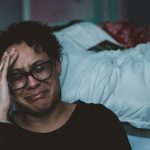
Anxiety
What is Anxiety?
An anxiety disorder is more than feeling a little stressed or worried. This is normal and helps us complete tasks and goals in out life. Without some anxiety, we would never study for that exam or do our job well at work. People with an anxiety disorder experience stress and worry at a higher level, which impacts on their ability to successfully complete day to day activities. Some people an anxiety disorder see issues in their lives worse than they may appear to others. This is call catastrophising. Others may not be able to go outside as they are worried about seeing people and being judged.
There are several different types of anxiety; social, generalised, panic disorder, obsessive compulsive disorder and specific phobias – spiders, flying, needles. All or based on the concept of excessive stress or worry. People with these disorders are not making them up and can’t just over them. They often require a variety treatments and support to manage their illness.
How do I know if I have it?
People experience anxiety in different ways. Some cannot sleep, with thoughts racing around in circles in their head. Other wake in the middle of the night worrying about things that may or may not happen. Others feel judged, worthless, scared, nervous, stressed or tense. Some people feel sick, sweaty, have a racing heart, dizzy or pins and needle sensations. Concentration may be difficult, have constant negative thoughts about themselves or feel like they are going to die.
There is are criterion that must be fulfilled to make the diagnosis. The DSM V is the guide that medical professionals use to assess if an anxiety disorder is present.
DSM-IV Criteria for Generalized Anxiety Disorder are:
- Excessive anxiety and worry (apprehensive expectation), occurring more days than not for at least 6 months, about a number of events or activities (such as work or school performance).
- The individual finds it difficult to control the worry.
- The anxiety and worry are associated with three (or more) of the following six symptoms (with at least some symptoms having been present for more days than not for the past 6 months): Note: Only one item required in children.
- Restlessness, feeling keyed up or on edge.
- Being easily fatigued.
- Difficulty concentrating or mind going blank.
- Irritability.
- Muscle tension.
- Sleep disturbance (difficulty falling or staying asleep, or restless, unsatisfying sleep).
- The anxiety, worry, or physical symptoms cause clinically significant distress or impairment in social, occupational, or other important areas of functioning. E. The disturbance is not attributable to the physiological effects of a substance (e.g., a drug of abuse, a medication) or another medical condition (e.g., hyperthyroidism).
There are several online tests that you can take to see if there is an issue:
If you have a score that is concerning, please see your GP.
How does this happen?
There seems to be several things that increase your risk of developing an anxiety disorder. If someone in your family has an anxiety disorder, you are increased risk. Stressful life events, chronic illness or injury, violence and certain medical condition increase your risk. Several personality types are at increased risk and experiencing chronic stress, via work, finances or family also increase the chance of developing an anxiety disorder. Finally, alcohol and drug use can increase the likelihood of developing an anxiety disorder, though many people use these things to manage their condition.
What is Pathophysiology?
Scientists are not certain as to what is happening biologically for an anxiety disorder to develop. There are changes in certain aspects of the brain, both in the way people think, form memories and the type and levels of the neurotransmitters in the brain, serotonin, noradrenaline and dopamine.
How do I fix it?
There are several ways to address anxiety disorders:
- Psychology: A psychologist may use cognitive behaviour therapy to assist in how your brain thinks about things. Graded exposure can also be utilised to assist with degrading the level of anxiety experienced. Many people are now using online guidance, called e-therapies to assist them. These are cheaper and can be easier for those who have trouble getting to a psychologist
- Medical: Your GP or psychiatrist may recommend medications to assist with recovery. The may suggest and antidepressant and occasionally a benzodiazepine. Benzodiazepines are used to reduce the experience of anxiety. They should only be used under strict supervision as there is a risk of addiction. Antidepressants are used to assist the neurotransmitters in the brain stabilise. Just be cause the drug is called an antidepressant, does not mean it may not be helpful! There are other medications used at times, such as lithium and antipsychotics for severe cases.
- Relaxation and meditation: both are designed to calm the mind and help provide a clearer picture of what lies ahead.
There are many websites that are set up to assist those with anxiety:




